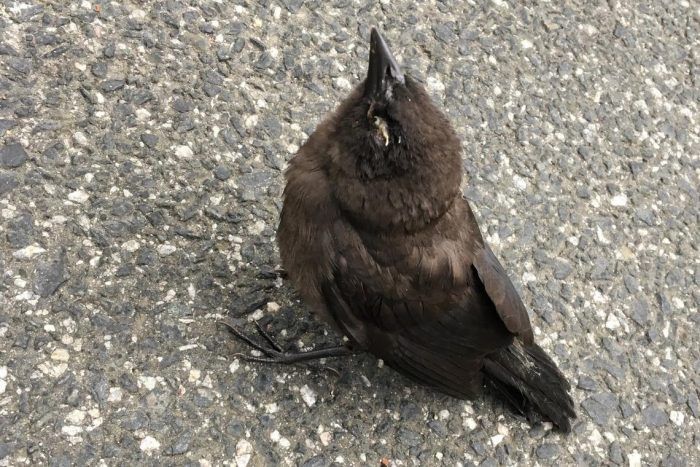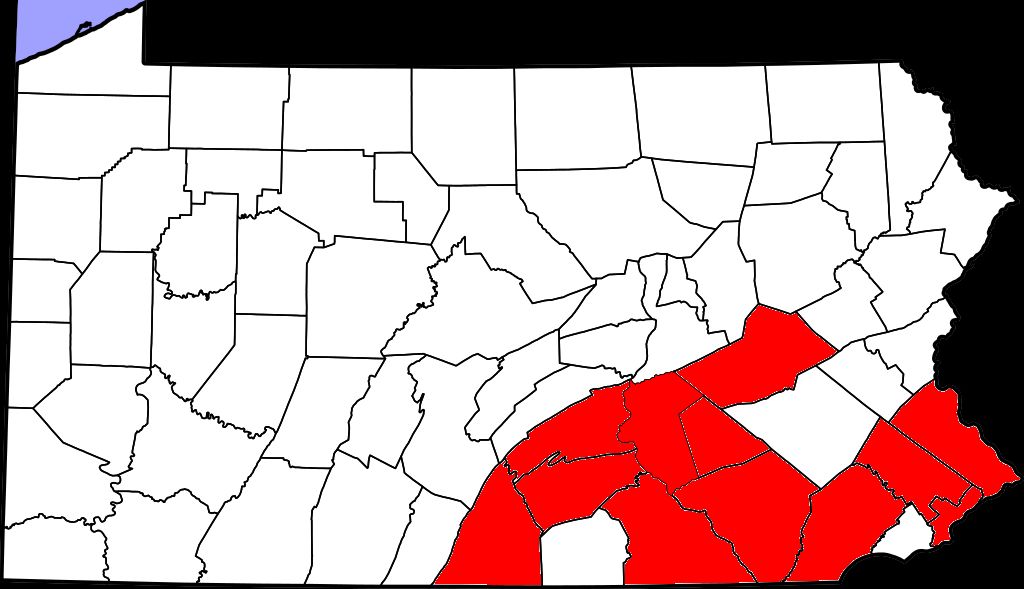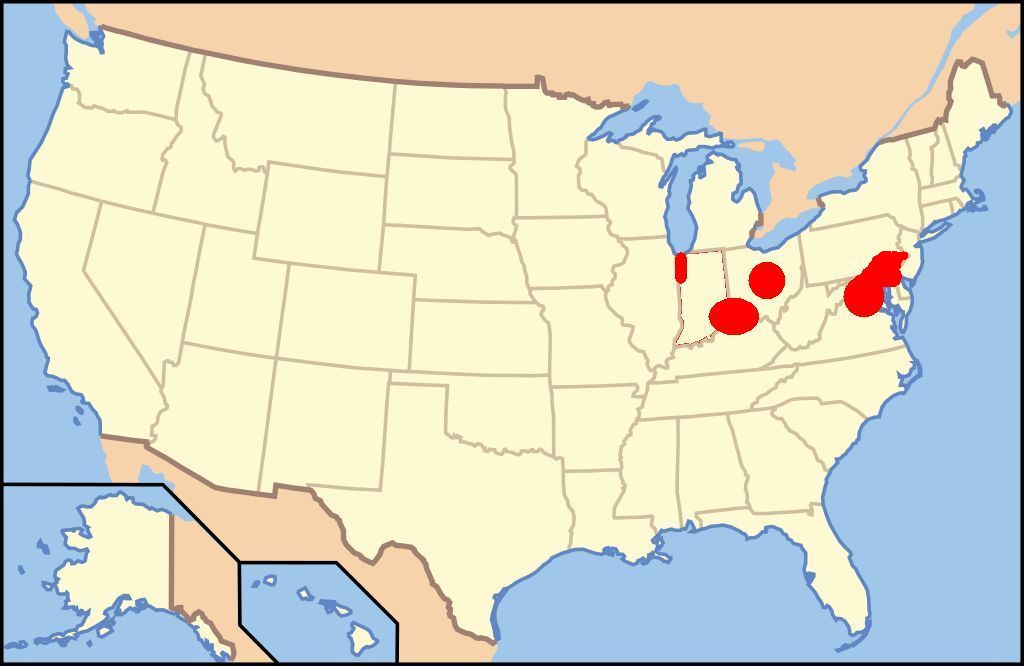
2 July 2021
UPDATE 13 Aug 2021: The PA Game Commission has announced an end to bird feeding restrictions. The illness has faded away on its own.
The mysterious songbird illness that is blinding and killing songbirds in six states has now spread to Pennsylvania and Delaware. Yesterday the PA Game Commission advised the public to remove feeders and bird baths to slow the spread.
Symptoms of the illness include a discharge and/or crusting around the eyes, eye lesions, and/or neurologic signs such as falling over or head tremors. Infected birds always die. Scientists are investigating but still don’t know what’s causing it.
The disease has been reported in 27 Pennsylvania counties in these species: blue jays, European starlings, common grackles, American robins, northern cardinals, house finches, house sparrows, eastern bluebirds, red-bellied woodpeckers, Carolina chickadees, and Carolina wrens. Tri-State Bird Rescue and Research in Newark, DE has found that the disease primarily affects fledgling European starlings, blue jays, and common grackles.

Yesterday Audubon Society of Western Pennsylvania (ASWP) joined the PA Game Commission in urging the public to follow these precautionary measures:
- Cease feeding birds and providing water in bird baths until this wildlife mortality event has concluded to prevent potential spread between birds and to other wildlife.
- Clean feeders and bird baths with a 10% bleach solution.
- Avoid handling dead or injured wild birds. Wear disposable gloves if it’s necessary to handle a bird.
- Keep pets away from sick or dead birds as a standard precaution.
- To dispose of dead birds, place them in a sealable plastic bag and discard with household trash. This will prevent disease transmission to other birds and wildlife.
To underscore the point, Audubon Nature Stores will discontinue the sale of seed and bird feeders for the time being.
Do your part. Stop feeding birds until this wildlife crisis is over.
A NOTE TO COMMENTERS: Comments on this blog are moderated. If you post a comment that is profane or could inflame others, I will edit it or delete it.
UPDATE, 2 July 2021: The mysterious illness has now been reported in DC + eight states: VA, WV, MD, PA, DE, IN, OH, KY and more closely matches the Brood X cicada map though this may be a coincidence. My revised attempt at mapping the bird death hotspots, below, is just a rough idea not the whole story. i.e. Do not rely on my map!

UPDATE from PA Game Commission, 8 July 2021 (posted here on 21 July): As of 8 July 2021 Wildlife Futures received 1,525 reports of dead birds in Pennsylvania. Roughly 25-30% (approximately 500) are likely associated with the current songbird mortality event. To date, the morbidity/mortality event appears to be targeting fledgling common grackles, blue jays, European starlings, and American robins. So far the following pathogens have been ruled out: Salmonella, Chlamydia, avian influenza virus, West Nile virus, Newcastle disease virus, herpesviruses, poxviruses, and Trichomonas parasite.
(photo from NPS via DNREC, maps from Wikimedia Commons. Click on the captions to see the originals)
Southwest Florida Eagle cam showed two baby eagles with a similar eye disease
They were treated at a nearby place named CROW and were returned to the nest
fully recovered and they eventually fledged.
Sorry to go off topic? Is this the Janet Schramm who lived in Ridgewood.
So what happens if we just found a dead sparrow in our small koi pond? It is Memorial Day weekend 2022? It has no signs of trauma or being attacked by a predator.
J Wenger, the “mysterious illness” is over but there are plenty of other bird diseases. This year, 2022, avian flu is a factor in North America. Read more about it here: https://www.birdsoutsidemywindow.org/2022/04/11/this-years-bird-flu-how-to-protect-birds/
I have read that the temporary taking down on bird feeders and baths does not include hummingbird feeders. Is that the case?
Betty, I see that Audubon of Western PA says to take down hummingbirds feeders but Delaware (where they have seen some bird deaths) says it’s OK to keep them up.
–> Comments are moderated on this website. This comment has been edited. Original spelling has been left as is. <-
The game commission is filled with idots … They aren’t going to stop this … they tell you what to do while they do nothing.
Please do take the time to report any diseased birds which you may encounter so that we may track the extent of the problem.
About a week ago I found two dead young robins close to their nest. Had not heard of this disease, but thought they had some kind of disease so I did use rubber gloves and put them in a plastic bag, in fact two. Then put it into the trash.
Live in Cheswick Pa
We took down our feeder. Is it OK to spread seed on the ground for the birds?
Deb, putting seed on the ground would be the same as keeping your feeders up, so … not OK. The reason for not feeding birds right now is to reduce the chance of them congregating and catching the disease from each other.
If as it appears the illness is coming from birds eating cicadas and we stop feeding then won’t they just eat more cicadas? When my feeders are empty or down the birds still just hang around for days anyway. I worry they are dependent. They go through 20 to 40 lbs of seed in a week or so. Hopefully the juveniles won’t starve?
I agree. Birds hang out together feeders or not.
Our area in Southern PA, Harford County, and Baltimore County gets its fair share of toxic chemicals via chem trail spraying every day the sun shines and there’s no wind. Also, sewage sludge is being used in farmland in PA and in Maryland consistently. We even get Canada’s sewage sludge coming into PA. Synagro lied to the farmers here and elsewhere for decades. No one is listening to the evidence. Why? Big money to be made by Synagro, Calypso and yes, good old Halliburton! Then you remember the book written by Dr. Rachel Carson years ago with the title, “The Silent Spring.” I’ve noticed a squirrel some months ago wobbling and unable to keep his balance as well as cardinals that had a bald like look to their heads. This was a few months ago before the “pandemic.” So, if humans are being poisoned, do you really think that birds and wildlife won’t manifest illness? They are the canary in the coal mines! It seems that Monsanto and other companies who want to make a profit, still keep RoundUp on the shelf as well as other toxic products. Profits mean more to them than human life or animal life. Again, it’s all about money. If people speak up about what’s happening, they get silenced, and some die for speaking the truth. We’ve seen this already within other arenas. So sad that our nation’s integrity has been lost!
Agreed…
Can’t speak to the squirrels, but the “bald-like look” to cardinals and other birds is likely to be mites.
This was what came to mind when I first heard about this. Sadly.
I did not see any sign of this and I feed birds. I live in northern York county pa
Nailed it ?
My nephews wife just told me about a bald and diseased looking cardinal on her deck. She lives in Millersville, PA.
Sylvia, a bald cardinal is probably OK. This is Bald Bird Season for some cardinals & blue jays (see this link https://www.birdsoutsidemywindow.org/2015/06/30/bald-bird-season/). Ask her to look closely for symptoms of the mysterious illness: diseased-looking eyes and/or staggering or falling over.
Give em all masks and tell em to stay 6 feet apart. In a year and a half, maybe they can have an outdoor barbecue together.
Would it be the Lanternflies ? They are so bad in my yard eating the trees we have no birds or woodpeckers, where always in the tree, & yard even
Mary, my hunch is that it is not the lanternflies. Lanternflies are a big problem in eastern PA but are not found in Ohio and Indiana where the mysterious bird deaths are also happening.
What about those 144000 genetically modified mosquitoes that were released?
Well lucky for my birds and squirrels…I ran out of birdseed to fill my feeders AND money to get more. I first noticed the squirrels did not come back. Somehow I miss their presence and antics. I cleaned my feeders each time before refilling. They are down now. Could the cleaning process be harmful to them? I always used Dawn and rinsed thoroughly and waited for the feeder to be dry before filling. This would take an
8 -12overnight process. Could the process damage the coating on the feeder? As they also poop on the feeders, did or does their poop mixed in with the feed before it was empty be a cause of the spread? We cannot teach them a new trick.
Sad to hear of their plight. No matter how it happened, hope we can know soon what changes will overcome this soon. Miss seeing them all in my backyard.
Debi, here’s some good news! (click on the link) Update 1 Aug 2021: Mysterious Bird Illness is Fading Away
When will we know it’s ok to start feeding and putting out water for them again ?
I’m waiting to hear if it’s ok. I’m sure they’ll make an announcement at some point.
Bob, here’s some good news! (click on the link) Update 1 Aug 2021: Mysterious Bird Illness is Fading Away
Thanks Kate, please keep us updated on the feeder situation. Our family and neighborhood do enjoy the birds. I plant many natural sources of food, bee balm, sunflower, etc, and hope these do not adversely affect the birds.
Jackie, here’s some good news (click on the link). Update 1 Aug 2021: Mysterious Bird Illness is Fading Away
I see that your map is around western part of pa, we live in the northeast section, most of us around have stopped feeding our birds and sad to say we dont hear them in the mornings, or afternoon. 🙁 I hope something is found soon.
Here’s some good news (click on the link). Update 1 Aug 2021: Mysterious Bird Illness is Fading Away
I just checked in to see if their was any new guidance on this problem. I miss them hanging out right in front of my windows. I planted tons of flowers this year that produce natural seeds. They seem to be frequenting the sun flowers, and other seed and nectar producing flowers. The additional flowers have drawn in more humming birds this year. It’s been a welcome bonus to the hard work.
zakkiyya, here’s some good news (click on the link). Update 1 Aug 2021: Mysterious Bird Illness is Fading Away
Does anyone think we will be able to feed the birds in NW PA during the winter months? I miss seeing all of them in my back yard! Thanks in advance!
Ginny, it’s looking hopeful: https://www.birdsoutsidemywindow.org/2021/08/01/update-aug-1-mysterious-bird-illness-is-fading-away/